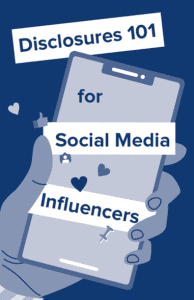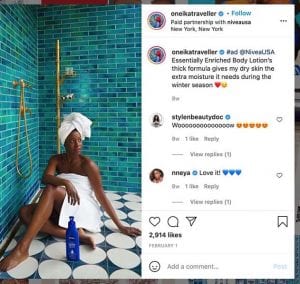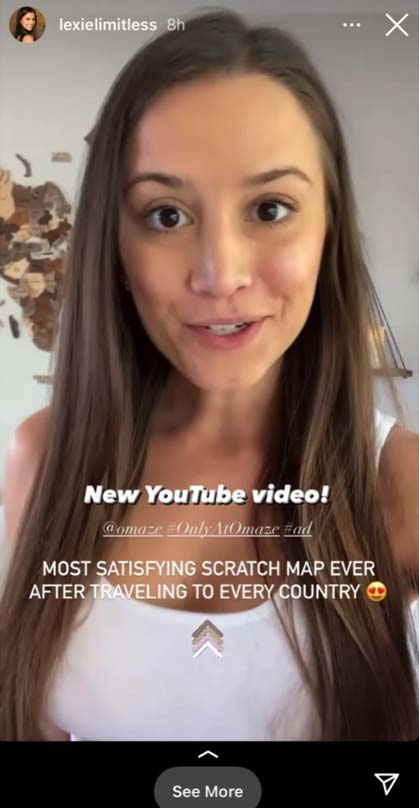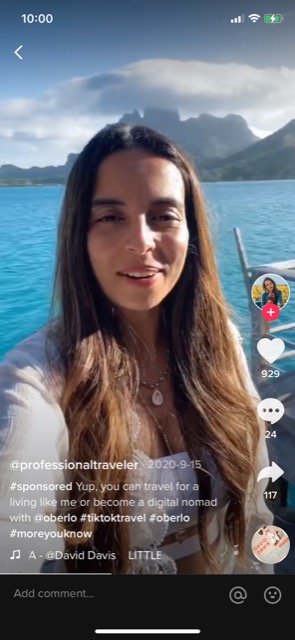For Immediate Release
April 14, 2022
Travelers United
CONTACTS:
Lauren.Wolfe@travelersunited.
Charles.Leocha@
TRAVELERS UNITED SUES TRAVEL INFLUENCER FOR DECEPTIVE ADVERTISING
Washington, DC – Travelers United is suing travel influencer Cassandra De Pecol and her LLC Expedition 196 for unfair and deceptive advertising in violation of the District of Columbia’s Consumer Protection Procedures Act (CPPA).
This is the first non-profit lawsuit against an influencer for deceptive advertising. The Federal Trade Commission (FTC) has not acted with haste in social media advertising enforcement so Travelers United felt compelled to bring this private attorney general action in DC’s Superior Court.
“Travelers United is taking a stand against deceptive advertising on social media,” says Lauren Wolfe, Counsel for Travelers United. “It is a violation of the law when influencers make up claims to grow their follower count. Additionally, it violates the law for influencers to push products and promote brands without disclosing they are being paid to do so. The toxic culture of undisclosed advertising and fake claims by influencers needs to end.”
Included in De Pecol’s false claims are the following:
-
De Pecol has falsely claimed she is the first woman to travel to every country. She is not the first woman to travel to every country.
-
De Pecol regularly advertises and promotes goods without disclosing she is being paid to promote those products.
-
De Pecol charges $4,500 for one Instagram post
Additionally, De Pecol is potentially making up sponsorships that do not exist in reality for her to appear more interesting and adventurous than she actually is. De Pecol claims to be the “first sponsored astronaut to travel to space with Virgin Galactic.” No one at Virgin Galactic would confirm this claim. Made-up sponsorships have not been addressed by the FTC, but pretending a sponsorship exists when it does not is a violation of the District’s CPPA.
“Travelers United is concerned about the increasing prominence of travel influencers with false claims and deceptive sponsorships that are seeping into every aspect of American life,” adds Wolfe. “Meta, which owns Instagram, must take more proactive steps to remove disinformation from their platform.”
Travelers United demands a correction to all 325 Instagram posts and seven TikToks that are in violation of the FTC’s guidance on social media influencing and a removal of any reference of her being the first woman to travel to every country on all of her social media channels. We request that NBC and CNN retract their De Pecol articles. We strongly suggest Gillette Venus Razors, Quest Nutrition, Marriott Hotels, and GoDaddy correct their advertisements that include De Pecol or remove them entirely.
The lawsuit was covered in The Washington Post on April 13, 2022, by Taylor Lorenz.
For more information about the case, please visit TRAVELERS UNITED SUES TRAVEL INFLUENCER FOR DECEPTIVE ADVERTISING
The mission of Travelers United is to identify and promote ways to improve and enhance travel for consumers across all modes of travel. Travelers United is a nonprofit tax-exempt 501(c)(3) organization.
________________________________________________________________
Travel Influencing is Largely Unregulated. That’s the Problem & Why Travelers United is Suing.
________________________________________________________________
On April 13, 2022, The Washington Post’s Taylor Lorenz reported on Travelers United’s lawsuit against Cassie De Pecol and her LLC, Expedition 196. We regret that we have to bring this lawsuit but it does not appear that Meta is capable of regulating truth on its platform and the FTC has yet to bring a legal action against influencers.
Travelers United decided to take this bold step after seeing increasingly bold lies from this one particular influencer. De Pecol raised funds from investors with a pitch deck that said she would be the first woman to travel to every country (not true) and she sent out press releases saying she was going to be the first woman to travel to every country (not true). Her beautiful photos and false press releases gained her attention in press throughout the world including pieces on CNN and NBC News that are still up.
After finishing her travels, she gained over a half a million Instagram followers and started a lucrative career as an influencer. Her own promotional material claims that she charged $4,500 per Instagram post. As her follower count grew, she was likely able to charge more per post. She advertised for GoDaddy, Gillette Venus Razors, Marriott Hotels, Anthropologie, Quest Nutrition, Oral B, Mazda, Alo Yoga, Subway and Sun In Hair Lightener. She got a book deal and started hosting a popular podcast with Wondery Media. Also, apparently bored with her false claim of being the first woman to every country, she started claiming that she would be the first sponsored astronaut. In her Wondery bio, she stated that she was going to go to space with Virgin Galactic. That’s interesting because when Travelers United called Virgin Galactic they didn’t seem to have ever heard of her.
Travelers United’s Counsel, Lauren Wolfe, worked on this case for over a year following De Pecol’s undisclosed brand relationships and false claims. Wolfe, who lives in DC, was able to purchase goods directly from De Pecol’s Instagram accounts and have them mailed to her house in DC. Based on that, she is subject to DC advertising laws which forbid unfair and deceptive practices.
Wolfe stated “This lawsuit regrettably had to be brought because Meta is clearly not capable of regulating itself and the Federal Trade Commission (FTC) does not currently have the manpower to take this on. Non-profits should not be doing the job of the FTC. Reigning in pervasive deceptive advertising by influencers is one of the few issues that unites Republicans and Democrats today. No one wants to be duped. We hope the FTC can get the manpower it needs to take on this important form of advertising that is only going to become more prominent every year.”
“Travelers United is concerned about the increasing prominence of travel influencers with false claims and deceptive sponsorships that are seeping into every aspect of American life,” says Lauren Wolfe, counsel at Travelers United. “Meta, which owns Instagram, must take more proactive steps to remove disinformation from their platform.”
Until then, Travelers United demands a correction to all 325 Instagram posts and seven TikToks that are in violation of the FTC’s guidance on social media influencing and a removal of any reference of her being the first woman to travel to every country on all of her social media channels. We request that De Pecol stop saying, and remove all reference to being the first sponsored astronaut as part of the Virgin Galactic team if she does not actually have a trip to space planned. We request that NBC and CNN retract their De Pecol articles. We strongly suggest Gillette Venus Razors, Quest Nutrition, Marriott Hotels and GoDaddy correct their advertisements that include De Pecol or remove them entirely.
________________________________________________________________
Travelers United Press Release
________________________________________________________________
For Immediate Release
April 14, 2022
Travelers United
CONTACTS:
Lauren.Wolfe@travelersunited.
Charles.Leocha@
TRAVELERS UNITED SUES TRAVEL INFLUENCER FOR DECEPTIVE ADVERTISING
Washington, DC – Travelers United is suing travel influencer Cassandra De Pecol and her LLC Expedition 196 for unfair and deceptive advertising in violation of the District of Columbia’s Consumer Protection Procedures Act (CPPA).
This is the first non-profit lawsuit against an influencer for deceptive advertising. The Federal Trade Commission (FTC) has not acted with haste in social media advertising enforcement so Travelers United felt compelled to bring this private attorney general action in DC’s Superior Court.
“Travelers United is taking a stand against deceptive advertising on social media,” says Lauren Wolfe, Counsel for Travelers United. “It is a violation of the law when influencers make up claims to grow their follower count. Additionally, it violates the law for influencers to push products and promote brands without disclosing they are being paid to do so. The toxic culture of undisclosed advertising and fake claims by influencers needs to end.”
Included in De Pecol’s false claims are the following:
-
De Pecol has falsely claimed she is the first woman to travel to every country. She is not the first woman to travel to every country.
-
De Pecol regularly advertises and promotes goods without disclosing she is being paid to promote those products.
-
De Pecol charges $4,500 for one Instagram post
Additionally, De Pecol is potentially making up sponsorships that do not exist in reality for her to appear more interesting and adventurous than she actually is. De Pecol claims to be the “first sponsored astronaut to travel to space with Virgin Galactic.” No one at Virgin Galactic would confirm this claim. Made-up sponsorships have not been addressed by the FTC, but pretending a sponsorship exists when it does not is a violation of the District’s CPPA.
“Travelers United is concerned about the increasing prominence of travel influencers with false claims and deceptive sponsorships that are seeping into every aspect of American life,” adds Wolfe. “Meta, which owns Instagram, must take more proactive steps to remove disinformation from their platform.”
Travelers United demands a correction to all 325 Instagram posts and seven TikToks that are in violation of the FTC’s guidance on social media influencing and a removal of any reference of her being the first woman to travel to every country on all of her social media channels. We request that NBC and CNN retract their De Pecol articles. We strongly suggest Gillette Venus Razors, Quest Nutrition, Marriott Hotels, and GoDaddy correct their advertisements that include De Pecol or remove them entirely.
The lawsuit was covered in The Washington Post on April 13, 2022, by Taylor Lorenz.
For more information about the case, please visit https://www.travelersunited.
The mission of Travelers United is to identify and promote ways to improve and enhance travel for consumers across all modes of travel. Travelers United is a nonprofit tax-exempt 501(c)(3) organization.
A Handy Guide for Travel Influencing

Influencers Must Disclose Material Connections to a Brand/Product
There are many influencers who specifically focus on travel. Even with general lifestyle influencers, many make travel at least a small part of their personal brand. Travelers United would like to strongly remind influencers that the Federal Trade Commission (FTC) has issued guidance that must be followed in order for social media posts to be legally compliant.
The FTC has made a very easy to follow guide for Influencers – Disclosures 101 for Social Media Influencers
Clear and Simple Language
Clear and simple language must be used for disclosures. For example, let’s use the example of an influencer at the hypothetical Springfield Hotel. “Thanks to The Springfield Hotel for the free room” is enough if the text is placed at the beginning of the post in a hard-to-miss spot. Meaning, the influencer must make sure that his text is at the beginning of his post – not at the bottom after four paragraphs of his thoughts, tips, and recommendations about Springfield. The text here would be an appropriate disclosure if the influencer simply got free accommodation in exchange for his social media post.
Alternatively, if the Springfield Hotel is paying an influencer to stay at their hotel and advertise through their social media channel, the influencer should make sure “Ad” “Advertisement” or “Sponsored” are prominently placed in the text. This is more than a free stay, this is paid relationship and advertisement. The influencer needs to make that clear. The easy way to do this is to simply write in the text “Ad | I loved my stay at The Springfield Hotel. It’s such a great hotel…”
Many social media platforms now have a disclosure tool but the FTC says “Don’t assume that a platform’s disclosure tool is good enough, but consider using it in addition to your own, good disclosure.” In other words, if an influencer is posting on Instagram, don’t assume using “Paid Partnership with The Springfield Hotel” at the top is a substitute for writing Ad at the beginning of the text. It’s not. Influencers should write both “Ad” at the beginning of the caption below the photo and use the Instagram disclosure tool in addition.

@Oneikatraveller shows how to be FTC compliant in this Instagram post of hers where she partnered with Nivea. The first word of her caption is #ad and additionally, she uses Instagram’s paid partnership disclosure tool at the top where it says “Paid partnership with niveausa.” This is the compliance the FTC expects on Instagram.
Video 
If you are speaking on Instagram stories in a video, on TikTok, or on any video platform, the FTC has made clear that the disclosure cannot just be in the text below the video. The Disclosures 101 for Social Media Influencers states “if making an endorsement in a video, the disclosure should be in the video and not just in the description uploaded with the video. Viewers are more likely to notice disclosures made in both audio and video. Some viewers may watch without sound and others may not notice over superimposed words.” Remember! Audio and video disclosures are what the FTC is looking for with video endorsements. An influencer should verbally state the connection as well as write it out in the caption.
Here @lexielimitless shows how to be FTC compliant in a video Instagram story. She’s talking about a product, mentions the relationship verbally, and has #ad imposed over the video for the entire time while she is speaking.
 False Statements
False Statements
It goes without saying but the FTC believes influencers should not make false statements in relation to selling a product. Influencers must be honest about who they are, where they come from and what they represent when making an advertisement. Otherwise, as the FTC says in their Guide Concerning the use of Endorsements and Testimonials in Advertising, “advertisers are subject to liability for false or unsubstantiated statements made through endorsements… endorsers may also be liable for statements made in the course of their endorsements.” The FTC has made clear an influencer cannot just make up claims about themselves to help sell a product.
Here @professionaltraveler on TikTok talks about her remote work that allows her to travel which is made possible with Oberlo. She does actually own an online business which she operates remotely while traveling. She mentions this verbally in the video in addition to making sure #sponsored is the first word in her post. This is what the FTC is looking for regarding compliance on TikTok.
It’s Not Just About Money – Disclose Any Personal, Family, Employment Relationship
The FTC says “Financial relationships aren’t limited to money. Disclose the relationship if you got anything of value to mention a product.” To follow our example, if an influencer’s mom is the General Manager of The Springfield Hotel and the influencer starts posting about her love of the hotel, the connection must be clear. The influencer may not personally profit from the hotel but a direct family member does. Remember, the FTC simply wants influencers to use clear and simple language. Something like “My mom is the General Manager of The Springfield Hotel so I love this hotel. I grew up going here! Look at me enjoying the pool above.”
Conclusion
When in doubt, keep it simple. The FTC has the ability to fine people and companies millions of dollars for violations. This does not just stop at the FTC. State Attorneys General could get involved to enforce compliance and even a nonprofit could take action. If you are getting paid to post, even just a little bit, make sure to add an “Ad” to the start of your post. Never pretend to be something you are not when selling a product. We look forward to seeing your content!


